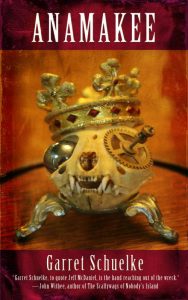Garret Schuelke has recently published Anamakee, who we’ve recently reviewed, and who has been kind enough to accept an interview. If you’re interested in more of his work please check out his other books, Wotan and Blind Grave Robber/Agnostic Eggs.
Hello, Garret. Thank you so much for accepting this interview, Cultured Vultures appreciate the opportunity. How are you?
It’s Monday, and I’m up and about after a 10-hour work day, so I’m pretty good. I actually meant to respond to these questions yesterday on Easter, when I had nothing else to do, but I read that Jim Harrison passed away, so I became too bummed out to really do anything besides lay in bed and watch Youtube videos. Besides my home town literary hero, K.J. Stevens, Harrison was another Michigan writer who actually made me feel that, as a Michigander, I could produce literature worthy of attention (especially since he’s also from northern Michigan—Grayling, to be exact).
Besides your novel Anamakee you have written two poetry books, Wotan and Blind Grave Robber/Agnostic Eggs. In your opinion, are there any major differences or similarities between the two styles you think is worth noting?
Blind Grave Robber/Agnostic Eggs is composed of two poetry chapbooks I created back in 2008 and 2009, along with some extra writings. Blind Grave Robber was mainly inspired by Raegan Butcher, whose style is generally micro and gritty. Agnostic Eggs, unlike Blind Grave Robber, was more silly and surreal—mainly inspired by Richard Brautigan—but I didn’t try to get it out as much due to troubles printing it, and the fact that I was about to move to Kalamazoo for college, and just wanted to get out of my home town.
What separates Wotan from BLG/AE is that I wrote the majority of it as prose poems, akin to the likes of Allen Ginsberg and Carl Sandburg. I also didn’t try to be so “poetic” and abstract with my feelings—I just let go, let every thought free-flow. Since I’ve haven’t written any new poetry since (all the stuff I have been posting recently on my Bakunin Incorporated Tumblr blog is all old stuff I’ve had stored away), I currently consider Wotan my greatest poetry effort. I hope to write poetry again with enthusiasm in the future, but right now it’s just not happening.
Who do you think are the main writers that have inspired you and heavily influenced your writing?
Ernest Hemingway and Haruki Murakami are my two biggest influences. Though separated by time, styles, and general subject matter, I consider them two sides of the same coin, and I aspire to be as good as both. My favourite part of their writings: Hemingway was descriptive enough to create an enthralling scene out of anything—whether it a battle, fishing, or whatever—and Murakami is great at creating interactions between his characters. Both are equal to me when it comes to dialogue (again, despite both having vastly different styles).
I’m going to cheat and list the rest of my influences that I have on my Goodreads profile: Amy Hempel, Robert E. Howard, Noah Cicero, Tao Lin, Jack Kerouac, Carl Sandburg, Billy Childish, Raegan Butcher, Jack London, Chad Kultgen, Allen Ginsberg, Henry Rollins, William S. Burroughs, Nelson Algren, Edgar Rice Burroughs, Osamu Dazai, Bob Dylan, Woody Guthrie, Kanye West, Thom Jones, Louis-Ferdinand Celine, John Fante, Dan Fante, K.J. Stevens, Patton Oswalt, Doug Stanhope, Norma Howe, Masashi Kishimoto. Maurice Leblanc, Hubert Selby, Scott Snyder.
To make up for my cheating, I suggest everyone check out these writers that I vastly enjoy. Unlike most of my heroes, they are still alive, and are always in need of recognition and new fans: Gareth Spark, Brian Alan Ellis, Bud Smith, Ben Tanzer, Christopher Gutierrez, A.B. Syahid, Terry Wooten, Barry Graham, Christoph Paul, Sam Pink, Jereme Dean, Heiko Julien, Gabino Iglesias, Megan Boyle, Frank Hinton, Rusty Barnes, Justin Grimbol, Sheldon Lee Compton, Chris Dankland, Matthew Dexter, Juliet Escoria, Ben John Smith, CV Hunt, Richard Chiem, John Withee, August Smith, Chelsea Martin, Ben Brooks, Elizabeth Ellen, Chloe Caldwell, Scott McClanahan, Gabriel Rheaume, Patrick Maher, and Laurence Rivers.
What was the process of writing Anamakee?
Write as much as possible in the given amount of free time I have. The writing for Anamakee, along with everything else I’ve written since 2013, is dictated by the time I have when I’m not working my day job, which usually leaves me exhausted—sometimes to the point that even on my days off I don’t feel like writing. It doesn’t help either that I’m generally a slow writer. Other than that, I wrote most of it in my room, and at the East Grand Rapids branch of the Kent County.
Do you have any specific memory regarding your decision in becoming a writer? Was there any event that strengthened your resolve?
I think I decided that I wanted to be a writer sometime in the sixth grade, mostly because I liked doing it, and because I was also a huge video gamer in my childhood-teen years, and reading magazines like Electronic Gaming Monthly made me want to combine the two and become a famous game reviewer.
I got into poetry back in 2007 when I was living in Traverse City. My dreams of writing prose—both journalistic and fiction—weren’t going anywhere. I came across a book by Raegan Butcher called Stone Hotel, and it totally changed how I looked at poetry. His other poetry book, Rusty String Quartet, made me want to write my own.
I slowly inched my way back into prose from then on until 2013. By this time, the only real prose I’ve written that I considered good was the work I did as a student journalist at the Western Herald, my first major Godan story, Lycaon, and the prose poems that made up Wotan. I really got back into writing fiction in 2014, when my appendix went to shit, and I spent nearly a month recovering. The unwarranted feelings of hopelessness and failure, fuelled by the fact that I was back at my parents house (even if it was just because they loved me enough that they wanted to watch over me as I recovered) and no longer working (though I still had my job because, you know, workers rights laws), made me want to give it my all. I mainly wrote at the Alpena Community College library. I think I wrote five stories total by the time I was cleared to go back to work.
 Pardon my language, but I feel like Anamakee is a novel withoutbullshit. To me, it reads like something real. Where there are good and bad things alike and sometimes there’s no satisfying ending for our decisions in life. Was that your intention as an author?
Pardon my language, but I feel like Anamakee is a novel withoutbullshit. To me, it reads like something real. Where there are good and bad things alike and sometimes there’s no satisfying ending for our decisions in life. Was that your intention as an author?
My intention, as with every story I write, is to create something that I find fulfilling to myself and entertaining to readers. When it comes to Anamakee specifically, I wanted to create a story of a troubled young person who is back living in his hometown, along with creating an origin story of sorts for my character, Floyd Spicer.
While I do go out of my way to convey a feeling, and occasionally a theme, I never write with the intention to spread a message or advocate an opinion. I would say your interpretation is on point, as is everyone else’s.. Hemingway wrote “If a writer of prose knows enough about what he is writing about he may omit things that he knows, and the reader, if the writer is writing truly enough, will have a feeling of those things as strongly as though the writer had stated them.” He was writing about his “Iceberg Theory” prose style, but I also like to apply this to reader interpretation as well.
The fact that you consider my work worthy enough to take the time to interpret it means I wrote “truly enough”.
In your day-to-day life do you ever feel like the literature world, in general, is lacking something? If so, what do you think is at miss?
I remember reading in some biography, I think it was on Bob Dylan or the Beat Generation, that stated that rock stars took the position of fame that writers used to hold until the sixties. If this is actually true, then I would say I miss the status that writers *supposedly* used to have. Aside from celebratory fantasies, I would say my bibliography and bank account would be vastly bigger if writers were regarded on the same level as rock stars.
I have more complaints about the literary world than things I miss—all of which are unoriginal, boring, and have been said hundreds of other times by more well-known writers. Scott McClanahan summed up one of my major beefs pretty well in a recent interview he did: “Artists are just people who say mean shit about one another on Facebook. Seems like they’re all really into social change now too. Hope it works out for them.”
Do you have a regular routine before you start typing? Like, have a cup of coffee, listen to some music, or watch two hours of a sad movie to get that melancholic feeling going.
I write all my first drafts in longhand. It’s a terrible habit I got to get out of, since it makes editing a bitch, and it slows me down just as much as my day job and writing speed. I usually listen to music on Spotify on shuffle, and I drink either beer (various craft beers, Saugatuck Brewing Company being my favourite brand), orange juice, and/or water.
Could you tell us anything about your future projects?
Currently, I’m shopping around my short story collection, Whup Jamboree, to publishers and agents. I’m hoping to have my third poetry book, Bakunin Incorporated, published next year (either through Riot Forge, or some other small poetry press). I’m also outlining and semi-working on my second novel, and, as always, writing short stories that involve my three literary characters: Floyd Spicer, Imogene McDonald, and Godan.
To end on a high note: if there was an aspiring writer right here, in front of you, what kind of advice would you give them to help them on this bittersweet journey?
I would tell them to pursue anything outside of writing that interests them—not just casually, but really study up on them. I would say that 90 percent of the stories I write, the situations, themes, settings, and even characteristics of the characters, all have sprung out of my non-writing interests.
Some of the coverage you find on Cultured Vultures contains affiliate links, which provide us with small commissions based on purchases made from visiting our site.

